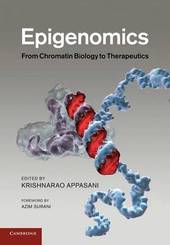
|
Epigenomics: From Chromatin Biology to Therapeutics
Paperback / softback
Main Details
| Title |
Epigenomics: From Chromatin Biology to Therapeutics
|
| Authors and Contributors |
Edited by Krishnarao Appasani
|
|
Foreword by Azim Surani
|
| Physical Properties |
| Format:Paperback / softback | | Pages:574 | | Dimensions(mm): Height 244,Width 170 |
|
| ISBN/Barcode |
9781107697836
|
| Classifications | Dewey:572.86 |
|---|
| Audience | | Professional & Vocational | |
|---|
| Illustrations |
24 Tables, black and white; 24 Plates, color; 88 Halftones, unspecified; 12 Line drawings, unspecified
|
|
Publishing Details |
| Publisher |
Cambridge University Press
|
| Imprint |
Cambridge University Press
|
| Publication Date |
10 July 2014 |
| Publication Country |
United Kingdom
|
Description
Understanding mechanisms of gene regulation that are independent of the DNA sequence itself - epigenetics - has the potential to overthrow long-held views on central topics in biology, such as the biology of disease or the evolution of species. High throughput technologies reveal epigenetic mechanisms at a genome-wide level, giving rise to epigenomics as a new discipline with a distinct set of research questions and methods. Leading experts from academia, the biotechnology and pharmaceutical industries explain the role of epigenomics in a wide range of contexts, covering basic chromatin biology, imprinting at a genome-wide level, and epigenomics in disease biology and epidemiology. Details on assays and sequencing technology serve as an up-to-date overview of the available technological tool kit. A reliable guide for newcomers to the field as well as experienced scientists, this is a unique resource for anyone interested in applying the power of twenty-first-century genomics to epigenetic studies.
Author Biography
Krishnarao Appasani is the Founder and Chief Executive Officer of GeneExpression Systems, a conference producing organization focusing on Biomedical and Physical Sciences. He is editor of MicroRNAs: From Basic Science to Disease Biology (2007) and RNA Interference: From Basic Science to Drug Development (2005), also published by Cambridge University Press.
Reviews'This is an excellent work, highly readable and well documented by more than a hundred scientists from academia and industry. The extensive coverage of current theory, new technologies, and disease mechanisms, all associated with epigenomics, make this book invaluable to students and researchers in a wide range of disciplines. Recommended for all academic libraries.' Atsuo Ogura, RIKEN BioResource Center, Japan 'Congratulations on a great book! It is a very impressive collection of high-quality contributions in several relevant areas of epigenetics. I enjoyed reading it and I am sure that it will be a very useful resource for everyone in the epigenetics field. I will definitely recommend it to my colleagues!' Karl Ekwall, Karolinska Institute, Sweden '... Appasani gathers our present knowledge about epigenomics in this interesting book. The topics covered will allow the reader to understand the role of epigenetic mechanisms in cell biology and disease. At the same time, this book offers a good opportunity to learn about the epigenomic techniques applied in both basic research and in biotechnology and biomedical companies.' Marian Martinez-Balbas, CSIC-Barcelona Molecular Biology Institute '... provides a broad coverage of the key aspects of epigenetics and its future potential to treat epigenetic related diseases. I recommend this book as an excellent up-to-date reference for established investigators in the field of epigenomics and to newcomers who want an update of the recent developments in this field. The book can also serve as a reference text for students as part of an advanced course on molecular biology.' Richard L. Momparler, University of Montreal 'This book is an excellent update on the current status of epigenomics, a relatively new discipline of life sciences bridging genetics and epigenetics ... The book covers the different aspects from basic science to available technology and highlights the significant impact of epigenomics on the understanding of human disease. Epigenetic abnormalities are very critical in the pathogenesis of human cancer; the understanding of epigenetics is of importance for the development of innovative therapeutics including the potential pharmaceutical use of (pluripotent) stem cells. Experts in their field provide up-to-date information making the book very valuable ...' Christine Guenther, Apceth GmbH and Co. KG, Munich
|